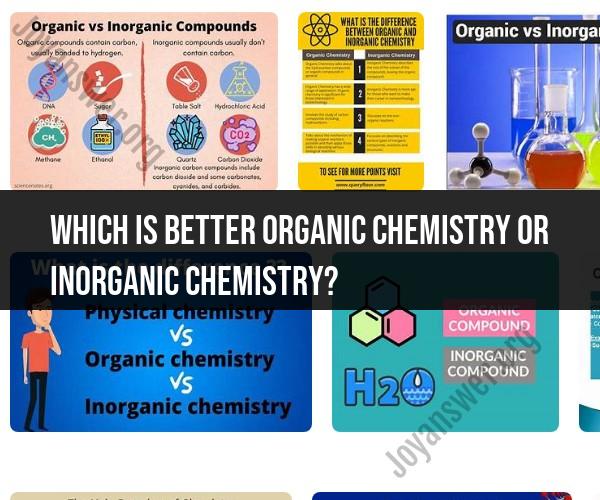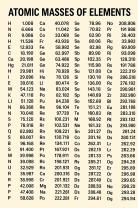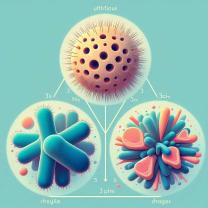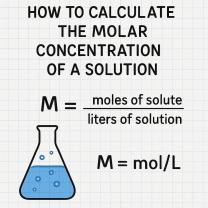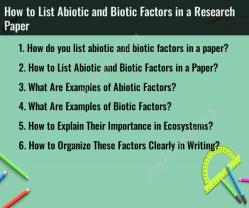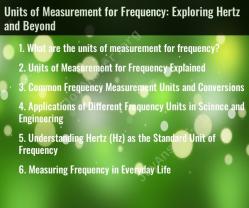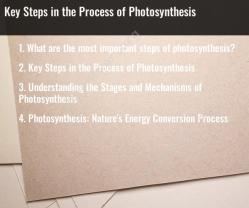Which is better organic chemistry or inorganic chemistry?
The choice between organic chemistry and inorganic chemistry depends on your interests, career goals, and the specific field of chemistry that appeals to you. It's not a matter of one being "better" than the other; rather, it's about which aligns with your preferences and objectives. Here are some considerations to help you decide:
Organic Chemistry:
Molecules with Carbon: Organic chemistry primarily deals with the study of carbon-containing compounds. This field explores the structure, properties, and reactions of compounds like hydrocarbons, alcohols, and carbohydrates, among others.
Biochemistry and Pharmaceuticals: Organic chemistry is essential for understanding biochemistry, drug development, and the synthesis of pharmaceuticals. If you're interested in medicine, pharmacy, or the life sciences, organic chemistry is highly relevant.
Synthesis and Reaction Mechanisms: Organic chemistry often focuses on the synthesis of complex molecules and understanding the mechanisms of chemical reactions. If you enjoy puzzle-solving and understanding how molecules interact, this field is a good fit.
Chemical Industry: The petrochemical industry, plastics manufacturing, and the production of a wide range of consumer products rely on organic chemistry. A career in these industries may require expertise in this field.
Inorganic Chemistry:
Non-Carbon Compounds: Inorganic chemistry studies compounds that do not contain carbon-hydrogen (C-H) bonds. This field encompasses metals, minerals, and a wide range of inorganic compounds.
Catalysis and Materials Science: Inorganic chemistry plays a critical role in catalysis (accelerating chemical reactions) and materials science. It's vital for creating catalysts and developing new materials with unique properties.
Environmental Chemistry: Inorganic chemistry is important in the study of environmental processes, including water purification, soil chemistry, and the behavior of pollutants in the environment.
Coordination Chemistry: Inorganic chemists study coordination compounds, which are essential in fields like bioinorganic chemistry and coordination compounds' role in biological systems.
Ultimately, there is no universal "better" choice between organic and inorganic chemistry. The best choice for you depends on your interests and career goals. Many chemists specialize in one of these fields, while others may integrate both organic and inorganic chemistry into their work. If you're unsure, consider taking introductory courses in both fields to see which one resonates with you and aligns with your aspirations in the world of chemistry.
Comparing Organic Chemistry and Inorganic Chemistry: Which is Better?
Organic chemistry and inorganic chemistry are both important branches of chemistry, but they focus on different things. Organic chemistry is the study of carbon-based compounds, while inorganic chemistry is the study of all other compounds.
Organic chemistry is often considered to be more challenging than inorganic chemistry, but it is also more rewarding. Organic compounds are essential for life, and they play a role in a wide range of products, from pharmaceuticals to plastics.
Inorganic chemistry is also important, as it provides the foundation for understanding many different materials and processes. Inorganic compounds are used in everything from fertilizers to batteries to semiconductors.
So, which is better? It really depends on your interests and goals. If you are interested in studying the chemistry of life, then organic chemistry is the way to go. If you are interested in studying the chemistry of materials and processes, then inorganic chemistry is the way to go.
Key Distinctions Between Organic and Inorganic Chemistry
Here are some of the key distinctions between organic and inorganic chemistry:
| Characteristic | Organic Chemistry | Inorganic Chemistry |
|---|---|---|
| Focus | Carbon-based compounds | All other compounds |
| Complexity | Organic compounds are generally more complex than inorganic compounds | Inorganic compounds are generally simpler than organic compounds |
| Applications | Organic compounds are used in a wide range of products, from pharmaceuticals to plastics | Inorganic compounds are used in a wide range of materials and processes, from fertilizers to batteries to semiconductors |
| Examples | Methane, ethanol, glucose, proteins, DNA | Water, carbon dioxide, salt, metals, minerals |
Practical Applications of Organic and Inorganic Chemistry
Organic chemistry has a wide range of practical applications, including:
- Medicine: Organic compounds are used to make a variety of pharmaceuticals, including antibiotics, painkillers, and cancer drugs.
- Agriculture: Organic compounds are used to make pesticides, herbicides, and fertilizers.
- Materials science: Organic compounds are used to make a variety of materials, such as plastics, rubber, and synthetic fibers.
- Energy production: Organic compounds are used to make fuels, such as gasoline and ethanol.
Inorganic chemistry also has a wide range of practical applications, including:
- Construction: Inorganic compounds are used to make a variety of building materials, such as cement, concrete, and glass.
- Manufacturing: Inorganic compounds are used to make a variety of products, such as metals, ceramics, and electronics.
- Water treatment: Inorganic compounds are used to purify water and remove pollutants.
- Environmental protection: Inorganic compounds are used to reduce pollution and clean up contaminated sites.
Choosing Between Organic and Inorganic Chemistry Courses
When choosing between organic and inorganic chemistry courses, it is important to consider your interests and goals. If you are interested in studying the chemistry of life, then you should choose organic chemistry courses. If you are interested in studying the chemistry of materials and processes, then you should choose inorganic chemistry courses.
It is also important to consider the prerequisites for each course. Organic chemistry courses typically require a strong foundation in general chemistry. Inorganic chemistry courses may or may not require prerequisites, depending on the specific course.
If you are unsure which course to choose, you should talk to your academic advisor. They can help you assess your interests and goals and choose the right course for you.
The Role of Chemistry Specializations in Scientific Research
Chemistry specializations play an important role in scientific research. Chemists with specialized training are essential for developing new products and processes, and for solving complex problems in areas such as medicine, energy, and environmental protection.
Organic chemists play a vital role in developing new pharmaceuticals and materials. Inorganic chemists play a vital role in developing new materials and energy technologies.
If you are interested in a career in scientific research, you should consider specializing in organic or inorganic chemistry. Chemistry specializations can give you the skills and knowledge you need to make a significant contribution to scientific research.
Conclusion
Organic chemistry and inorganic chemistry are both important branches of chemistry with a wide range of practical applications. The best way to choose between organic and inorganic chemistry is to consider your interests and goals. If you are unsure which course to choose, you should talk to your academic advisor.
